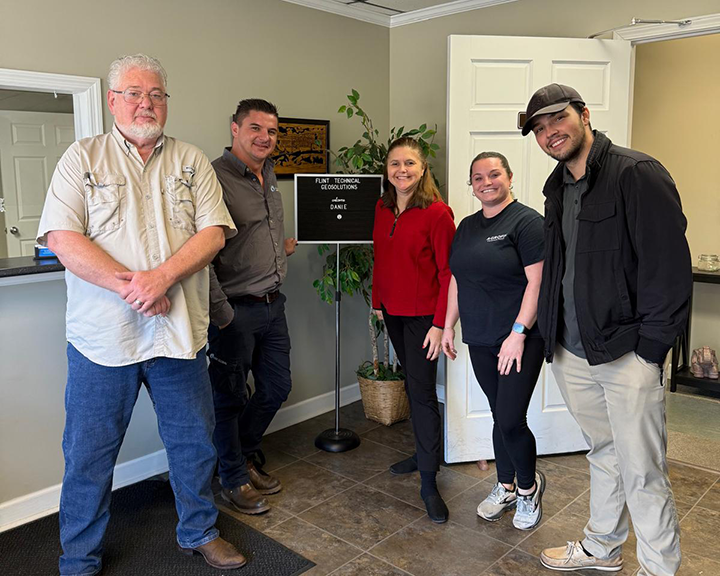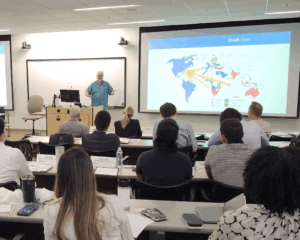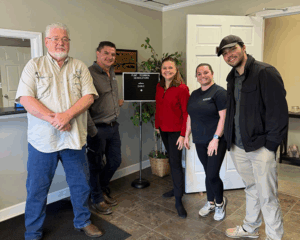
When Flint Technical Geosolutions (FTG), based in Metter, Georgia, was ready to expand internationally, President William Smallwood turned to the University of Georgia Small Business Development Center (UGA SBDC) for guidance and expert support. Through the UGA SBDC’s International Trade Center, Smallwood was able to navigate the complexities of expanding overseas—a move that generated an additional $2 million in revenue for the business.
FTG has carved out a global reputation for the engineering and manufacturing of innovative environmental solutions. Specializing in technologies that manage water removal and protect coastlines, FTG designs, manufactures and implements geosynthetic products used by industries ranging from wastewater treatment to habitat restoration to stabilize terrain. Their solutions, which span from local projects to large-scale international operations, are the result of decades of technical expertise and innovation.
Founded in 1995 by Smallwood, a civil engineer and former U.S. Army Corps of Engineers officer, and his brother Joe, Flint Industries originally focused on sludge capping. In 2004, the company pivoted into dewatering solutions using geotextile tubes, and by 2007 had added coastal tubes to its offerings. When Flint Industries was acquired and merged with its international sister company, FTG Group, in 2020, the newly unified Flint Technical Geosolutions began executing multimillion-dollar projects across the globe.
Smallwood knew that to grow the company’s impact, he would need support. That’s when he turned to the UGA SBDC and its International Trade Center.
The path to international growth, however, was not straightforward. In 2008, Smallwood reached out to Dimitris Kloussiadis, an international business consultant at the UGA SBDC, for guidance on how to manage foreign sales, secure payments, and handle international financing and distribution.
“The company was very successful domestically. They had inquiries from overseas but needed assistance with quotations, financing, the entire export process,” said Kloussiadis. “We developed a tailored training program specifically for FTG.”
With assistance from the International Trade Center of the UGA SBDC and the U.S. Export Assistance Center in Savannah, FTG completed its first overseas transactions in Italy and Venezuela. Since then, the partnership has flourished. Over the past two decades, Kloussiadis has helped FTG determine the exportability of its products, identify new markets, establish shipping networks, and navigate international payment methods and financing.
“We use Dimitris and his team, I won’t say daily, but at least every two weeks we’re on the phone with them,” Smallwood said.
Today, under the oversight of FTG Vice President and textile engineer Julie Kucera, the company has active projects in Canada, Brazil, France, Mexico, Panama, South Africa, Morocco, the UAE, Peru, Nigeria and Cameroon, among others. Most recently, FTG has expanded into India and Turkey, with the UGA SBDC’s International Trade Center continuing to support market research, network development and financing logistics.
Smallwood said the impact of the UGA SBDC’s support has been transformational.
“Dimitris doubled our international market just by showing us how to insure our receivables,” he said. “This allowed us to sell into markets where we have not sold before, by providing extended terms, without any risk to FTG.”
Since working with the UGA SBDC International Trade Center, the company’s international sales have grown by 250%, adding approximately $2 million in revenue and making up approximately 50% of total sales. This expansion has allowed FTG to increase its workforce by 14% and open regional offices in North America, Latin America and now South Africa, covering the Eastern Hemisphere.
In addition to receiving support, FTG has also given back. For the past three years, Kloussiadis has invited Smallwood to deliver the opening presentation at the UGA SBDC’s ExportGA program, an intensive, four-session course designed to prepare businesses for exporting. His presentation, sharing lessons learned from years of international expansion, is consistently one of the most well-received in the program. He and his team also volunteer as mentors for companies starting their export journeys.
“We do it because we owe the SBDC for the assistance they have given us and because we want to help others bypass some of the failures we experienced,” Smallwood said.
Smallwood credits the UGA SBDC International Trade Center for accelerating the company’s international success.
“The services the UGA SBDC International Trade Center provides are fantastic. I don’t know how we would have covered the ground we covered without their support,” he said. “They make the trip from point A to point B as direct and efficient as possible.”
“The services the UGA SBDC International Trade Center provides are fantastic. I don’t know how we would have covered the ground we covered without their support. They make the trip from point A to point B as direct and efficient as possible.”
William Smallwood





The UGA SBDC is funded through a cooperative agreement with the U.S. Small Business Administration.
All SBDC services are provided in a nondiscriminatory way to all legal residents and citizens in the United States. Reasonable accommodations for persons with disabilities will be made if requested at least two weeks in advance.

The UGA SBDC is an accredited member of America’s SBDC.
The University of Georgia
Small Business Development Center
382 East Broad Street
Athens, GA 30602-5412
P: (706) 542-2762